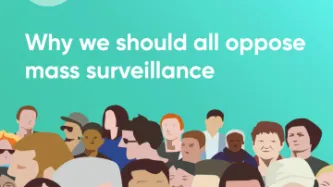Search
Content type: Examples
A woman was killed by a spear to the chest at her home in Hallandale Beache, Florida, north of Miami, in July. Witness "Alexa" has been called yet another time to give evidence and solve the mystery. The police is hoping that the smart assistance Amazon Echo, known as Alexa, was accidentally activated and recorded key moments of the murder. “It is believed that evidence of crimes, audio recordings capturing the attack on victim Silvia Crespo that occurred in the main bedroom … may be found on…
Content type: Advocacy
In this submission, Privacy International aims to provide the Office of the UN High Commissioner for Human Rights with information on how surveillance technologies are affecting the right to peaceful protests in new and often unregulated ways.
Based on Privacy International’s research, we provide observations, regarding the following:
the relationship between peaceful protests and the right to privacy;
the impact of new surveillance technologies in the context of peaceful protests…
Content type: Report
“...a mobile device is now a huge repository of sensitive data, which could provide a wealth of information about its owner. This has in turn led to the evolution of mobile device forensics, a branch of digital forensics, which deals with retrieving data from a mobile device.”
The situation in Scotland regarding the use of mobile phone extraction has come a long way since the secret trials were exposed. The inquiry by the Justice Sub-Committee, commenced on 10 May 2018, has brought much…
Content type: Examples
In late 2017, the residents of the small town of Santa Maria Tonantzintla, about three-hours away from Mexico City, discovered their town was intended to become a pilot smart city in a collaboration between the state of Puebla and the organisation Alianza Smart Latam. The town's residents, who had already lost its distinctive cobblestones, the clock tower, and a stucco bridge as part of the early stages of the project, filed an injunction to halt the project, which had failed to obtain the…
Content type: Long Read
Image credit: Emil Sjöblom [ShareAlike 2.0 Generic (CC BY-SA 2.0)]
Prepaid SIM card use and mandatory SIM card registration laws are especially widespread in countries in Africa: these two factors can allow for a more pervasive system of mass surveillance of people who can access prepaid SIM cards, as well as exclusion from important civic spaces, social networks, and education and health care for people who cannot.
Mandatory SIM card registration laws require that people provide personal…
Content type: Examples
The Lumi by Pampers nappies will track a child's urine (not bowel movements) and comes with an app that helps you "Track just about everything". The activity sensor that is placed on the nappy also tracks a baby's sleep.
Concerns over security and privacy have been raised, given baby monitors can be susceptible to hackers and any app that holds personal information could potentially expose that information.
Experts say the concept could be helpful to some parents but that there…
Content type: Advocacy
During its 98th session, from 23 April to 10 May 2019, the UN Committee on the Elimination of Racial Discrimination (CERD) initiated the drafting process of general recommendation n° 36 on preventing and combatting racial profiling.
As part of this process, CERD invited stakeholders, including States, UN and regional human rights mechanisms, UN organisations or specialised agencies, National Human Rights Institutions, Non-Governmental Organisations (NGOs), research…
Content type: Examples
In 2017, US Immigration & Customs Enforcement (ICE) announced that it would seek to use artificial intelligence to automatically evaluate the probability of a prospective immigrant “becoming a positively contributing member of society.” In a letter to acting Department of Homeland Security Secretary Elaine Duke, a group of 54 concerned computer scientists, engineers, mathematicians, and researchers objected to ICE’s proposal and demanded that ICE abandon this approach because it would be…
Content type: Examples
US Immigrations & Customs Enforcement (ICE) used social media monitoring to track groups and people in New York City associated with public events opposing the Trump administration’s policies, including ones related to immigration and gun control. The investigative branch of ICE created and circulated a spreadsheet, entitled ‘Anti-Trump Protest Spreadsheet 07/31/2018,” that provided details of events planned between July 31, 2018, and August 17, 2018. The spreadsheet pulled data from…
Content type: Examples
The US government created a database of more than 50 journalists and immigrant rights advocates, many of whom were American citizens, associated with the journey of migrants travelling from Central America to the Mexico-US border in late 2018. Officials from Customs and Border Protection (CBP), Immigration and Customs Enforcement (ICE), the US Border Patrol, Homeland Security Investigations, and the Federal Bureau of Investigation (FBI) had access to this database. This list allowed the…
Content type: Examples
A private intelligence company, LookingGlass Cyber Solutions, used social media to monitor more than 600 “Family Separation Day Protests” held across the United States on June 30, 2018, to oppose the Trump administration’s policy family separation policy. The policy was part of a “zero tolerance” approach to deter asylum seekers from coming to the United States by separating children from their parents. After collecting information about these protests through Facebook, including the precise…
Content type: Examples
In August 2017, it was reported that a researcher scraped videos of transgender Youtubers documenting their transition process without informing them or asking their permission, as part of an attempt to train artificial intelligence facial recognition software to be able to identify transgender people after they have transitioned.
These videos were primarily of transgender people sharing the progress and results of hormone replacement therapy, including video diaries and time-lapse videos. The…
Content type: Long Read
Imagine that every time you want to attend a march, religious event, political meeting, protest, or public rally, you must share deeply personal information with police and intelligence agencies, even when they have no reason to suspect you of wrongdoing.
First, you need to go to the police to register; have your photo taken for a biometric database; share the contacts of your family, friends, and colleagues; disclose your finances, health records, lifestyle choices, relationship status, and…
Content type: Examples
In a 2017 study of patterns of postings on Chinese social media, three Harvard researchers disagreed with the widespread claim that the government's strategy is to post "50c party" posts that argue for the government's side in policy and political debates. Instead, the researchers estimated that the Chinese government fabricates as many as 448 million social media comments a year but found that these avoid controversial issues and arguments with government skeptics. Instead, the researchers…
Content type: Examples
In 2015, The Intercept obtained documents showing that the Mall of America in Bloomington, Minnesota used a fake Facebook account to friend and monitor local Black Lives Matter activists, and collect their personal information and photographs without their knowledge. The account was discovered in a cache of files the Mall of America provided to Bloomington officials after a large BLM protest against police brutality that was held at the mall. After the protest, the city charged 11 protesters…
Content type: News & Analysis
On a hot day in Nairobi, our researcher is speaking to an officer of Kenya’s National Intelligence Service (NIS). The afternoon is wearing on and the conversation has turned to the presidential elections, taking place in August this year. He has just finished describing the NIS’ highly secret surveillance powers and the disturbing ways in which these powers are deployed.
“It is what you might call ‘acceptable deaths,’” he states about the misuse of communications surveillance powers. “People…
Content type: Report
This investigation focuses on the techniques, tools and culture of Kenyan police and intelligence agencies’ communications surveillance practices. It focuses primarily on the use of surveillance for counterterrorism operations. It contrasts the fiction and reality of how communications content and data is intercepted and how communications data is fed into the cycle of arrests, torture and disappearances.
Communications surveillance is being carried out by Kenyan state actors, essentially…
















